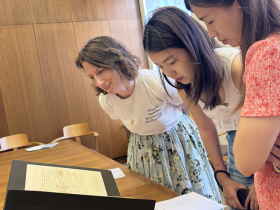The Academic Programme
Dive deep into fascinating subjects with the dedicated attention of Oxford academics and engage directly with cutting-edge research
Dive deep into fascinating subjects with the dedicated attention of Oxford academics and engage directly with cutting-edge research

All of our courses at LMH are designed and delivered by academics in Oxford. This makes our course portfolio completely unique in terms of its scope and depth. It also means that our courses provide the highest quality of teaching, rooted in direct engagement with groundbreaking research.
In a series of lectures, seminar discussions, and tutorials, you will expand your knowledge, explore new ideas, and enhance your critical thinking skills at LMH. All the while, you will benefit from access to world-class learning resources in our beautiful library on site.
The Oxford Tutorial System
At Oxford, tutorials provide an especially dynamic opportunity to learn from expert academics – your Tutors transform the tutorial into a space for enthusiastic debate, where you can grapple with challenging concepts and push at the intellectual frontiers of a topic together.
Working in groups of two to three students, you share ideas and cultivate your critical thinking skills. In this way, our Tutors at LMH encourage and empower their students to craft original, persuasive, and insightful observations and arguments.
The Co-Curricular Programme at LMH
Alongside your Academic Programme, our Co-curricular Programme provides an enriching educational experience beyond the classroom, where you can learn from Oxford academics who work across a variety of fields:
All of this is just part of what makes studying with LMH Oxford Summer Programmes such an unforgettable experience.
Lectures: 18 Hours
Seminars: 12 Hours
Tutorials: 3 Hours
Outside of contact teaching hours, students are required to undertake significant amount of independent study. An LMH Summer Programme is an intensive course of full-time study.

For each course, students produce one piece of assessed work every week, which is submitted to the Tutor and then discussed in a tutorial. At the end of each week, you will receive a percentage grade for your submitted work. Every assessment counts for a third of your final percentage grade, so your final grade is an average of the mark received for each piece of work. Students who stay for six or nine weeks will receive a separate grade for each 3-week course.
LMH Oxford Summer Programmes are full-time short academic programmes designed to be eligible for academic credit. As a guide, we recommend the award of 15 CATS / 7.5 ECTS / 4 US Credits for each 3-week course.
We provide a transcript of your assessed work, and can send this directly to your home institution if required and communicate with your home institution to facilitate this as needed.